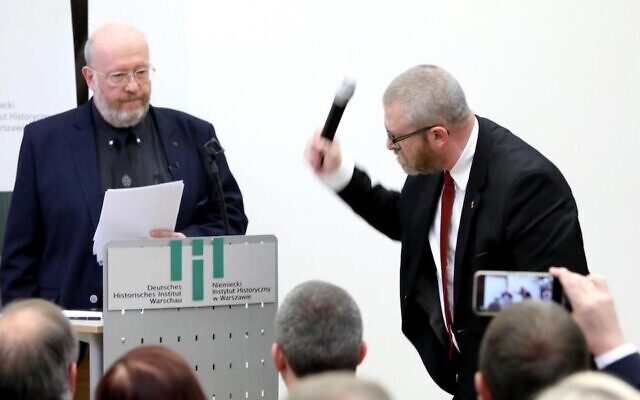Lecture on Holocaust in Poland canceled after far-right lawmaker storms podium
Politician, protesters disrupt speech in Warsaw by historian Jan Grabowski, a vocal critic of Poland’s efforts to constrain Holocaust discussion

JTA – Polish-Canadian historian Jan Grabowski was about to deliver a lecture in Warsaw Tuesday related to his battle against efforts by Polish leaders to suppress uncomfortable truths about the history of antisemitism in the country before and during the Holocaust.
But before Grabowski could get started, a far-right Polish lawmaker with a record of antisemitic statements stormed the speaker’s podium, smashing the microphone, knocking over loudspeakers, and yanking cables, according to Notes from Poland, an independent local outlet. Grzegorz Braun, of the Confederation party, later said he disrupted the event to defend Poland’s good name against Grabowski’s “historical propaganda.”
Warsaw-born Grabowski, a professor at the University of Ottawa whose father was a Jewish Holocaust survivor, has been a vocal critic of Poland’s efforts to constrain discussion of the Holocaust there. It became illegal in 2018 in Poland to accuse the country of complicity with Nazi crimes.
Grabowski recently published an academic study exposing the alleged distortion of Wikipedia articles on the Holocaust in Poland, leading to an unusual intervention by Wikipedia’s top authorities. He has drawn forceful criticism from right-wing nationalists and has even been prosecuted over his research.
“Nothing like this has ever happened to me, I felt like [I was] in Poland in the 1930s,” Grabowski was quoted as saying following the incident at his lecture.
When the police arrived at the scene, Braun invoked his parliamentary privilege and refused to leave Warsaw’s German Historical Institute even as the event was called off and the crowd vacated the premises.
Braun reportedly said he “refuses to leave the building [because] I am protecting the Polish nation against a provocative attack on our historical sensitivity. The Germans will not teach us history in Poland.”
When the Institute’s director, Milos Reznik, asked Braun to stop damaging the Institute’s property, Braun said he won’t take orders from a German and told Reznik, “Get out of Poland.” Reznik is Czech, not German.
Outside the institute, participants encountered a protest of the lecture led by Robert Bąkiewicz, a prominent nationalist figure. Ahead of the event, public media outlets dominated by the ruling right-wing Law and Justice criticized Grabowski and the government-run Institute of National Remembrance condemned what it characterized as efforts to blame Poland for German crimes against Jews.
Meanwhile, on Wednesday, the Auschwitz-Birkenau Museum and Memorial criticized the use of the Auschwitz death camp in a campaign video by Poland’s ruling party, Reuters reported. The video, which was posted on social media, discourages viewers from attending a political opposition rally slated for Sunday.
The video seizes on language used by a government critic, Tomasz Lis, who had tweeted that “a chamber” would be found for ruling party leader Jaroslaw Kaczynski and President Andrzej Duda, who is an ally of the party.
The video presents an image of the front gate of Auschwitz with its infamous slogan, “Arbeit macht frei” and asks, “Do you really want to march under this slogan?”
Lis said he meant to say “cell,” not “chamber,” and intended no allusion to Nazi gas chambers.
“The instrumentalization of the tragedy of people who suffered and died in the German Nazi Auschwitz camp – on either side of the political dispute – is an insult to the memory of the victims,” the Auschwitz museum said on Twitter. “It is a sad, painful and unacceptable manifestation of the moral and intellectual corruption of the public debate.”









